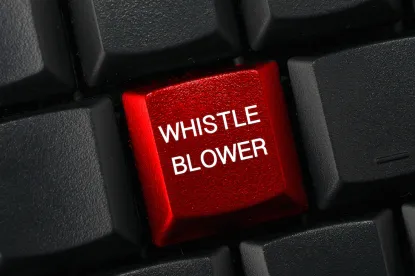On January 10, 2024, the United States Attorney for the Southern District of New York (SDNY) announced the creation of a Whistleblower Pilot Program (SDNY Whistleblower Program).1 While SDNY has long incentivized individuals to provide information through the offer of a potential agreement with the Government, historically that agreement could range from a cooperation agreement—which requires a guilty plea to criminal charges—to a non-prosecution agreement (NPA)—which does not—with no stated guidance on what factors the Government considers when determining the appropriate offer. For individuals with criminal exposure, an NPA is an extremely desirable outcome because it guarantees that the Government will not file charges as long as the individual complies with its demands, which usually entail full cooperation with the Government’s investigation and prosecution of other culpable individuals and/or companies.
By clarifying the path to an NPA through specific requirements, the SDNY Whistleblower Program seeks to further incentivize individuals to voluntarily self-disclose information. In so doing, it offers individuals who have information of misconduct an incentive to disclose that is similar to incentives provided to companies by the DOJ Criminal Division’s Corporate Enforcement and Voluntary Self-Disclosure Policy (CEP) and the recent United States Attorneys’ Offices’ Voluntary Self-Disclosure Policy (USAO VSD).
Though the interplay among the SDNY Whistleblower Program and its corporate counterparts—the CEP and USAO VSD—remains to be seen, companies should prepare for the predictable tensions likely to arise as a result of increased incentives for individuals to report corporate misconduct. Particularly, companies should beware of yet another avenue, in addition to the U.S. Securities and Exchange Commission’s whistleblower program (which offers monetary awards in exchange for information if various criteria are satisfied), for the Government to compete with companies’ compliance programs, and in particular confidential reporting structures. This memo summarizes the Program’s key aspects and breaks down potential risks and pressure points for companies to consider as the realm of voluntary self-disclosure evolves.
SDNY Whistleblower Program
The SDNY Whistleblower Program seeks to incentivize disclosure of information regarding conduct that involves fraud, control failures, and market integrity by companies, exchanges, financial institutions and investment funds, as well as state or local bribery. Notably, it does not apply to information regarding violations of the Foreign Corrupt Practices Act, campaign finance laws, federal patronage crimes, corruption of the electoral process, or bribery of federal officials. An NPA is available to any individual who is not a public official, federal agent, of major public interest, or the CEO or CFO of a company, and is conditioned on the following:
- Disclosure of misconduct not public or known to SDNY;
- Voluntary disclosure not in response to a Government inquiry or obligation to report;
- Substantial assistance in the investigation and prosecution of one or more equally or more culpable persons and full cooperation;
- Full disclosure of all criminal conduct in which the individual has participated and is aware; and
- No history of criminal conduct involving violence, force, sex offenses, national security, and no previous felony conviction, or conviction involving fraud or dishonesty.
An NPA is not off the table for an individual who discloses information but does not meet all of the above-listed requirements. The new guidance allows prosecutors to exercise discretion in accordance with principles articulated in the Justice Manual and assess compliance with the Program’s requirements on a sliding scale. This empowers prosecutors to offer an NPA if they determine that such an offer would be in the public interest and upon consideration of the extent of the individual’s fulfillment of the SDNY Whistleblower Program’s enumerated conditions.
Though the Program is limited to the SDNY, it is possible that other U.S. Attorney’s offices will follow suit if the Program is successful.
Practice Points
- Although an NPA is considered an extremely favorable resolution in the face of criminal exposure, it remains to be seen whether the SDNY Whistleblower Program will encourage individuals to self-report their own misconduct. An individual’s ability to satisfy the conditions set forth in the Program cannot be known with certainty ex ante, and prosecutors maintain discretion to determine fulfilment of the conditions. Moreover, the potential to secure resolution via an NPA even after the Government is aware of the misconduct could further diminish the incentive for individuals to come forward. The Program, though noteworthy for its transparency and as evidence of the Government’s continued emphasis on voluntary self-disclosure, by and large appears to formalize prior practice.
- Companies should thoroughly evaluate the incentives for individuals to self-report under the SDNY Whistleblower Program when conducting an internal investigation of conduct potentially within its scope, in particular with respect to the creation of an investigative plan and the internal dissemination of information.
- Though the SDNY Whistleblower Program appears intended to create a “race to disclose” between individuals and companies by placing additional pressure on companies to self-disclose and to do so promptly, given the uncertainty of the success of the Program, companies should continue to evaluate the benefits of self-reporting under the CEP and USAO VSD against the drawbacks. These factors, and the effect of the SDNY Whistleblower Program on them, should be weighed carefully with outside counsel.
- Finally, companies should continuously evaluate and evolve their compliance programs to be best situated to identify misconduct in the first instance and best positioned under the CEP and USAO VSD if faced with a Government investigation, whether or not self-reported.
FOOTNOTES
1 SDNY Whistleblower Pilot Program (Jan. 10, 2024), https://www.justice.gov/d9/2024-01/sdny_wbp_1.9.24.pdf.




 />i
/>i


